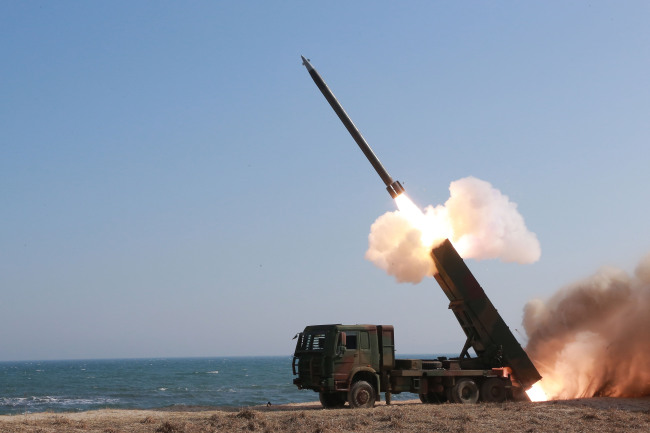Conservatives voice concerns over inter-Korean military agreement
By Yeo Jun-sukPublished : Nov. 21, 2018 - 15:38
A comprehensive inter-Korean military pact in the absence of significant progress on North Korea’s denuclearization could weaken South Korea’s defense capabilities, security experts and former generals said Wednesday.
At a defense seminar in Seoul, the participants criticized the Moon Jae-in administration for signing a “one-sided deal” that leaves South Korea vulnerable to North Korea’s asymmetric capabilities, pointing to the establishment of a no-fly zone and the suspension of joint exercises as examples.
While the ongoing detente between the two Koreas is welcome news for businesses and average citizens, the South Korean military should remain cautious about North Korea’s intentions and about Washington’s reluctance to be involved in a possible contingency, the analysts said.
“The worst-case scenario is a combination of North Korea’s bad intentions and the US ‘commercialism’ response,” Kim Tae-woo, former head of the Korea Institute for National Unification, said during the seminar at the War Memorial of Korea.

Given that South Korea has decided to suspend combined military exercises and pledged to take over wartime operation control from the US, President Donald Trump’s “America-first policy” might lead North Korea to “miscalculate” Washington’s security commitment to Seoul, Kim warned.
Trump prompted controversy with his surprise decision to halt the “expensive war games” after his summit with North Korean leader Kim Jong-un in June. In August, Trump said there was “no reason” to continue holding the military drills amid stalled follow-up talks with Kim on denuclearization.
Retired Army Gen. Shin Won-sik, who served as vice chairman of the Joint Chiefs of Staff, asserted that the inter-Korean military agreement left South Korea with weak surveillance capabilities for North Korea’s forward-deployed troops and artillery units.
“The agreement violates the basic principle of arms control. It should have focused on reducing aggressive weapons and expanding surveillance assets. Ultimately, the agreement has undermined security stability,” said Shin.
While South Korea previously used sophisticated weapons systems to offset North Korea’s superior conventional forces, Shin said, that advantage has been undercut as South Korea is now restricted from using its advanced assets for surveillance purposes.
Since Nov. 1, the two Koreas have been prohibited from flying fighter jets, choppers, drones and even balloons inside the no-fly zone. The zone extends 40 kilometers north and south of the Military Demarcation Line in the east and 20 kilometers in the west for fixed-wing aircraft.
The Defense Ministry said while the measure limits its ability to monitor North Korea’s massive frontline units, the gap can be bridged by more advanced reconnaissance assets employed by superior commands and US Forces Korea.
(jasonyeo@heraldcorp.com)








![[Graphic News] More Koreans say they plan long-distance trips this year](http://res.heraldm.com/phpwas/restmb_idxmake.php?idx=644&simg=/content/image/2024/04/17/20240417050828_0.gif&u=)
![[KH Explains] Hyundai's full hybrid edge to pay off amid slow transition to pure EVs](http://res.heraldm.com/phpwas/restmb_idxmake.php?idx=644&simg=/content/image/2024/04/18/20240418050645_0.jpg&u=20240419100350)





![[From the Scene] Monks, Buddhists hail return of remains of Buddhas](http://res.heraldm.com/phpwas/restmb_idxmake.php?idx=652&simg=/content/image/2024/04/19/20240419050617_0.jpg&u=20240419175937)

![[KH Explains] Hyundai's full hybrid edge to pay off amid slow transition to pure EVs](http://res.heraldm.com/phpwas/restmb_idxmake.php?idx=652&simg=/content/image/2024/04/18/20240418050645_0.jpg&u=20240419100350)

![[Today’s K-pop] Illit drops debut single remix](http://res.heraldm.com/phpwas/restmb_idxmake.php?idx=642&simg=/content/image/2024/04/19/20240419050612_0.jpg&u=)